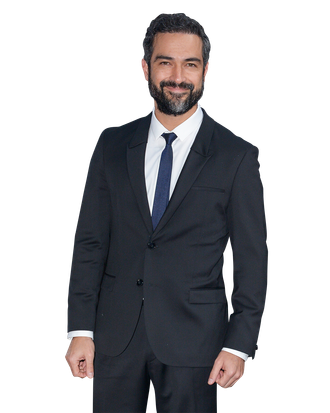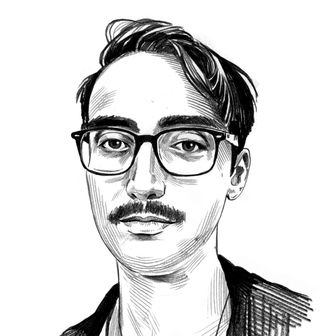
Spoilers for Ozark season four follow.
Over the first three seasons of Ozark, Marty Byrde (Jason Bateman) and his wife Wendy (Laura Linney) have dealt with a lot of enemies. When you launder money for a Mexican drug cartel, that comes with the territory: An average day’s work might include fighting off rival crime bosses and cutting temporary deals with FBI agents, all while maintaining legitimate businesses as a smoke screen. But with the show’s fourth and final season, the first half of which dropped this month, Ozark may have introduced its most unsettling villain yet: Javi Elizonndro (Alfonso Herrera), the recklessly violent nephew and lieutenant of Omar Navarro (Felix Solis).
In season four, Javi commits a number of shocking acts of violence, especially in the finale of part one, when he mercilessly kills long-standing characters Darlene Snell (Lisa Emery) and Wyatt Langmore (Charlie Tahan). But in Herrera’s hands, Javi isn’t just your run-of-the-mill charismatic psychopath. He’s a three-dimensional character, one who likes sharing a meal with colleagues as much as he does protecting his uncle’s business. Herrera spoke with Vulture about avoiding stereotypes with his performance and why Ozark is a necessary corrective to years of drug stories with a nationalist slant.
At the end of part one of this season, Omar, the former big villain, is in prison, and Javi takes his place as head of the cartel. This is the final season, so you’re the big villain at the end.
One of my first scenes was with Jason. When I was going to set, my only thought was, Alfonso, please don’t fuck this up. Don’t fuck it up! It’s an incredible character, it’s an incredible story, the writing is amazing, the directors are incredible, so it’s just up to you. It’s a pressure that is a privilege. But in the end, I think it wasn’t that bad. The response from the fans has been very positive toward Javier. They hate him, which is an amazing thing. It means that it works. I’m more than happy with the reaction.
You’ve played some violent guys before, especially a couple years back in Queen of the South. Where do you go in your head when you’re playing these men who are sometimes sadistic?
There are elements that give Javier a very dark and obscure energy. But on the other hand, I saw in the script some element that, from my point of view, needed to be underlined so there could be a balance. Javier wants to transform his family business into an enterprise, into something bigger. But on the other hand, he also is a guy who likes to enjoy the present. He enjoys these little things like a glass of wine. He likes to have a good conversation. When he sits down and when he has a meal, he really likes to connect with the people at the table. There is a balance, so that we can position ourselves far away from the cartoon or the cliché.
Do you imagine what he does when he’s not at work?
I think when Javier is home, he’s a very lonely person. That is how I portray him. He’s probably someone who enjoys his time alone. He enjoys having dinner by himself, but he’s a very lonely person. The strongest connection that he has to the outside world is with his mother. Basically, that’s it. And that is going to be explored with much more depth in the second part of season four.
I was about to ask what’s coming up for the character.
That area, that relationship that he has with his mother. Javier now understands, or at least he feels, this aura of power. When I received the episodes from 8 to 14, I just couldn’t stop reading. They saved the best for last. It’s going to be a grand finale.
One of the things that also strikes me about Javi is how freely he moves around, even when it comes to your body language playing him. He’s a hothead, but he’s also, in a way, weirdly relaxed when he’s committing violence.
This character is a guy who needs to feel comfortable in his skin. Because of that, yes, on the scale of Javier, he could be eating pastries one moment, and two seconds later he could be doing something completely different. It scratches a little bit at the image of a psychopath.
He’s also just really honest with people. This is a show where people are lying to each other all the time and working different angles. In that same scene when he brings the Byrdes pastries, he’s totally comfortable mentioning to them that he wanted them dead instead of Helen.
Javier is very straightforward. He doesn’t lie. When he tells Marty what his plans are for him, those plans are actually true. When he talks to Omar, he’s completely honest in what he thinks. And it has to do with this thing of trying to prove himself, trying to prove that he’s capable.
Javi does seem to have this very loving relationship with his uncle, especially early in the season. But then Omar is totally willing to throw him under the bus. I’m curious how you would describe their relationship and the way he’s a mentor to Javi, but then is also willing to turn on him.
I think Javier sees Omar as a father figure, as a male role model. He has so much aggression because he wants to prove not just to Omar that he’s capable of doing things, but to prove it to himself.
And Omar has this kind of responsibility with Javier because of the relationship that he has with his sister. I see Javier as the bastard son, from Omar’s position. It’s a very Shakespearean relationship where everything’s a little bit ambiguous, and even though they’re family, in families, there are bonds and connections that are stronger than others. The bond is there, but at the same time, Omar understands that Javier is not his son. He’s using him in order for him to advance.
You mentioned in one interview that Ozark doesn’t perpetuate the same narratives as other shows about drug trafficking. Can you say more about that?
We’ve seen so many drug lords and money laundering, and the cliché is always there. Not just talking about Javi, but the story. When we talk about this type of story, always the responsibility goes to the South. And this is why Ozark is such an amazing story, because it positions the responsibility also in the North. And that is why I think this show is so good. It positions the responsibility in a more democratic way.
Before you were on the show, there was a different FBI agent involved, and he had many unflattering qualities. The U.S.’s role, in the show, is never just the good guys defeating the bad guys in Mexico. We see that, especially in the last few episodes, the FBI is driven by profit. They’re keeping Omar and now Javi around because it suits them just as much as getting justice.
Exactly. The characters have light, and they have darkness. So it’s a very interesting element. And it doesn’t necessarily relate to the culture where I live; I think it relates to every single place in the world. In previous stories, the guys from the FBI, the U.S., the CIA, they come as the deus ex machina to save everybody. Here, it’s completely different. We are trying to keep our distance from those clichés.
This interview has been edited and condensed for clarity.


